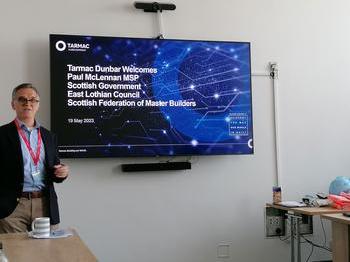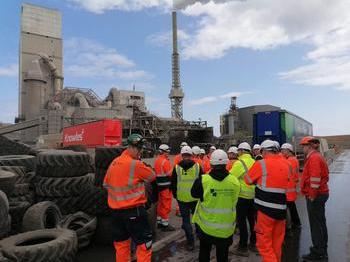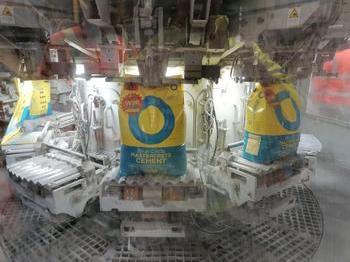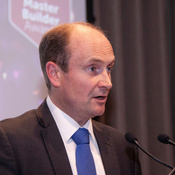One of the many materials building contractors are familiar and grapple with is cement, especially the bagged cement sold in builders’ merchants. Compared to large civil engineering contractors who deliver transport and infrastructure projects, FMB members won’t ‘consume’ nearly as much cement or concrete: and without cement there would be no concrete. However cement is a key material and one that some members were keen learn more about how it is made and why it has become more and more expensive.
Invitation to tour Scotland’s only cement plant
My thanks to Edinburgh-based member Steven Dalgleish of The Edinburgh Bathrooms & Kitchens Company who contacted Tarmac following a conversation we had about the Green Home Festival. Noting his own and FMB’s focus on green initiatives, retrofit and how collectively the construction sector needs to reduce its carbon footprint, Steven had concerns on “the huge problem that concrete manufacturing and laying presents to the climate change emergency.”

Following an exchange of emails, Tarmac’s Dwight de Morais set up a guided tour of the plant for FMB members on Friday 19 May. We were joined by the local MSP and Scotland’s Housing Minister Paul McLennan. On the day we learned that as an industry, the cement and concrete sectors are committed to going beyond Net Zero by 2050. They have a roadmap, produced by their trade association - the Mineral Products Association - in conjunction with its members, which sets out exactly what is needed to get there.
The plant is taking action on substituting fossil fuels with waste-derived fuels, including some that are wholly or partially biomass. These include:
- Processed Sewage Pellets (PSP)
- Solid Recovered Ful (SRF) - non recyclable elements of domestic waste
- Chipped Car Tyres (supplied by Kwik-Fit)
- Recovered Liquid Fuel (RLF)

On the use of electricity:
- They take power produced at their neighbour’s landfill site from methane which meets 15% of their need, and
- Their gird electricity is all from renewables
Scale of the operation

As well as learning about Tarmac’s progress on ‘greening’ (as far a possible) the production of cement, some of the statistics shared were impressive.
- The tower which sits above the furnace is 90 metres high.
- The energy bill for the plant is between £3000 - £4000 per hour.
- Over 300 contractors were on site for one month during their planned shut down for maintenance works in April.
- The furnace takes up to 36 hours to cool down before engineers can access it to service it and make repairs.
- The plant produces in excess of 700,000 tonnes of cement a year.
Coal, costs and climate policy

The energy bill for the plant partially explains why bagged cement is so expensive. However owing to Scottish Government policy which is basically “no support for the exploration, development and production of fossil fuels” this means that the coal used in the production process comes all the way from Mozambique. The cost per tonne being five times higher than previously sourced coal from across England and Scotland.
One final fact: concrete is the most consumed man-made substance on the planet and as noted earlier, without cement there would be no concrete. This puts into context the importance of plants like Dunbar.
Please contact Gordon Nelson at the FMB if you would like to find out more.







